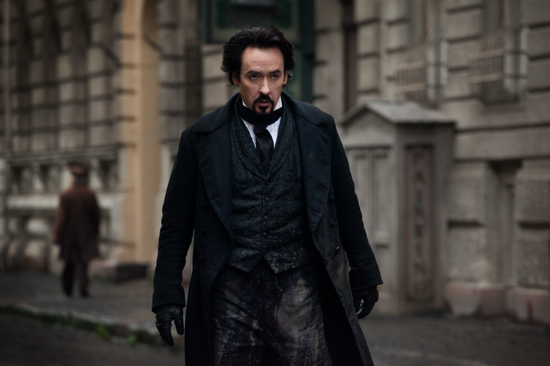In terms of creating fiction based on reality, you can’t get much better material than the final days of Edgar Allan Poe. On October 3rd 1849, the man behind such classic short stories as ‘The Pit And The Pendulum’ and ‘The Tell-Tale Heart’ was found incoherent on the streets of Baltimore, appearance dishevelled and clothes not his own. Never did he regain senses enough to explain his state to the perplexed onlookers and physicians who tended him, and no evidence has since been uncovered of his movements in the week prior. Poe died four days later of an unknown cause.
The amount of blanks to fill here is enough to tickle the salivary glands of any ballsy script scribe, but unfortunately when it comes to new thriller The Raven, we have a clear case of treading too lightly. The last week in the life of this fictional Poe sees the writer embroiled in a police investigation over a series of murders bearing resemblance to some of his more grisly tales. The sleuthing is overseen by Detective Emmett Fields, played by Luke Evans, and executed in a predictable follow-the-clues structure with the killer always one step ahead. When the perpetrator snatches Poe’s betrothed Emily (Alice Eve), the pair face a race against time to solve the puzzles before Emily meets her end.
Unfortunately, the chemistry between the two leading men in this picture is non-existent. A fact certainly not helped by Evans’ insistence on playing Fields like Christian Bale’s Batman in a cravat, with all the fluidity of a two-by-four. Eve’s performance as well is underwhelming to say the least, her only worthwhile dialogue coming from a reading of Poe’s ‘Annabel Lee’. Luckily, she spends much of the film enacting ‘The Premature Burial’ and thus carries little weight besides being a plot-plodder.
The saving grace is without doubt John Cusack. Unhinged, provocative, self-obsessed, often drunk yet uncomfortably articulate, he treads the line carefully between the versions of Poe that have been put across by sources of varying degrees of credibility. His diction is a bit jarring at first, as it should be for such a period piece. An early scene in which Poe attempts to wield some clout for a free tipple down the pub sees him shouting "Quoth the raven!" to the clientele, in the hopes that someone might quip back a "Nevermore", confirming his distinction. It is a perfect introduction to a complicated wit. However, the screenwriters seem to get lazy towards the end, with modern phrases such as "went a little nuts" cropping up. In fact, most of the problems with the film lie in the latter half. The plot’s momentum slows to a crawl after Emily’s abduction; relationships spontaneously shift without proper progress; Poe’s wit is smothered by the bland love story; worst of all, the big reveal of the murderer’s identity, though not expected, is distinctly unsatisfying due to errors in character development.
Similarly, the direction by James McTeigue (best known for the immaculate V For Vendetta) veers from meticulous to sloppy. Some scenes feature uncomfortable CGI and others rely too heavily on cheesy horror atmosphere effects like fog and lightning, killing any of the tension that might have survived the substandard script. On a more positive note, some of the gory visuals are quite well executed. The gruesome moment in which a literary critic is sliced by the realization of Poe’s swinging scythe is unrelenting and likely to give a start to anyone assuming that the scenario’s climax would actually follow the story it was drawn from, with the prisoner’s rescue at the very last moment.
Many of Poe’s greatest works can be categorised by their use of his two most famous literary devices: one being an inimitable technique in conjuring suspense, and the other his backwards puzzle-solving plotlines famously nicked by Sir Arthur Conan Doyle for Sherlock Holmes. The Raven attempts both, but doesn’t quite achieve either to a degree appropriate for its subject matter.
In suspense, Poe was a master at capturing the fleeting fearful mind of the paranoid, the pursued and the guilty, generally through a first-person narrative – his greatest examples being ‘The Pit And The Pendulum’, ‘The Tell-Tale Heart’ and the similar yet underrated ‘The Black Cat’. One can’t help but think that a finale revealing Poe himself to be the perpetrator, driven to frantic attempts at resurrecting the waning popularity of his works, would have been far more affecting, though possibly a bit obvious.
Other tales, such as ‘The Murders In The Rue Morgue’ and ‘The Purloined Letter’, cemented him as the first detective story author, by presenting a crime that is followed by the solution and then subsequent explanation. With this in mind, most frustrating is the treatment of Poe’s infamous death. Rather than wading through the messy and baffling course of events documented in history, The Raven gives Poe an ending that’s all too peaceful. Though the course of the fictionalised week does draw on some of that fateful day’s facts, others are skimmed over. With so much room for artistic free rein, it’s disappointing that this point seems the most rushed.
Perhaps it is unfair to compare an incredible literary canon to a fictional film account of its author, but it wouldn’t be necessary if it weren’t for the potential revealed by Cusack’s Poe who, at least in the first half of the movie, is staggeringly close to being definitive. His verbose and vivacious performance lifts the The Raven from slightly naff period action thriller – in the vein of From Hell – to something nearing its intention. Sadly, neither the writing, nor the direction, nor the supporting cast rise to his standard, leaving this impressive turn gasping for breath.


